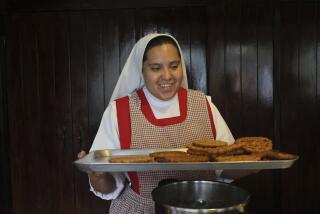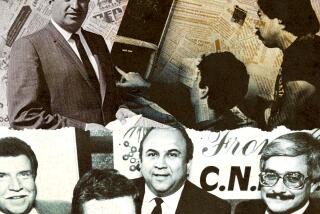2 Catholic Newspapers Leaving Encino for Offices of Legionaries
- Share via
ENCINO — Two national Catholic newspapers published in Encino will move next weekend to Connecticut offices owned by the Legionaries of Christ, a rapidly growing but little-known priestly order that was involved in the sale of the weeklies last year.
Even as the National Catholic Register and Twin Circle prepared to relocate next weekend, however, the weeklies’ new owner declined to spell out the relationship between the publications and the tight-knit religious order that some term “mysterious” in its dealings with outsiders.
The international order, which has doubled in size every 10 years since its 1941 founding, is interested in media ministries: One of its priests has had a Spanish-language radio program out of Los Angeles for years.
Yet Legionaries officials rarely provide other news media information about themselves or their unprecedented growth.
When the Register and Twin Circle, each languishing at about 20,000 subscribers, were sold last summer, knowledgeable Catholic editors outside California said sources had told them that the Legionaries were the real buyers and would probably inject new life into the papers.
But Jay Schwarz, executive director of the officially named owner, Circle Media Inc., a nonprofit corporation in New York, said in September that there was “no official link” to the Legionaries.
The only link Schwarz mentioned was that Father Anthony Bannon, the top Legionaries administrator in this country, helped to negotiate the purchase with the papers’ longtime owner, the Patrick Frawley family of Los Angeles.
Frawley said Friday that he sold the papers for $500,000 to “a group of investors who got together with the Legionaries.” Frawley, owner of a chain of centers for treatment of alcohol and other addictions, said he favored the Legionaries as a buyer because the religious order “has a similar interest in treatments to change addictive habits.”
Schwarz, asked again this week about a connection in light of the impending move to a Legionaries-owned building in Hamden, Conn., said, “I’m not saying there is [a connection], and I’m not saying there isn’t.”
At another point in the interview, however, Schwarz said, “The move out East has nothing to do with the Legionaries. The rent is very high in Los Angeles, and over 80% of our readers live in the New York and New England area. We hope to be in New York City in a few years, which won’t be expensive if someone donates space to us.”
The new offices will be in the New Haven area and within a 20-mile radius of the Legionaries’ U.S. headquarters in Orange and its U.S. seminary in Cheshire, all in Connecticut.
Loretta Seyer, editor of the family features-oriented Twin Circle, said that she believed the Legionaries “want to consolidate us back East . . . Economically it makes more sense for them to put us there.”
Both Seyer and Joop Koopman, editor of the Register, indicated in interviews that they were only able to describe the order’s relationship to Circle Media Inc., in general terms.
“We understand that the Legionaries will provide spiritual direction to Circle Media, but won’t be involved in the day-to-day editorial and business decision-making,” Koopman said. “I think they want to avoid the idea that the newspapers will be a house organ for the Legionaries.”
Only Seyer and Koopman will be moving. Fifteen other employees at the high-rise office on Ventura Boulevard will have left or been fired by next weekend, a spokesman said. Gabriel Meyer, who writes for both papers, will remain in Los Angeles.
In the National Catholic Register’s Jan. 7 issue, Schwarz told readers that announcement of the paper’s acquisition had been delayed until promises could be made about cutting delivery time from a present lag of up to two weeks.
“The purchase was not made with a view to any significant change in editorial content,” Schwarz wrote. He added that the Register would expand its lineup of writers, cut delivery time to subscribers in order to provide “breaking news” and an “up-to-date and accurate view of the church” while remaining a loyal ally of papal teachings.
Rome appears to hold the Legionaries in high esteem, not only because its rapid growth contrasts with the declining numbers of most other religious orders but also because its traditional church outlook and support for the authority of the hierarchy matches the atmosphere in the Vatican, observers say.
*
The Vatican granted the Legionaries’ new university in Rome, Regina Apostolorum, the coveted status of Athenaeum in unusually short time, according to the Rome-based magazine, “Inside the Vatican.” The magazine reported last year that the order was operating six seminaries, 10 universities and 640 lay training centers in 15 countries.
Founded by then-seminarian Marciel Maciel in Mexico City, the Legionaries are distinctive among priestly orders for giving seminarians a dozen years or more of education and work experience before ordaining them as priests, as do the Jesuits. To become a diocesan priest, a man needs only four to six years of seminary training.
As a result, the priests are greatly outnumbered by seminarians, who are called “brothers.” The order now has 43 priests and 208 seminarians in North America and about 350 priests and 2,300 seminarians worldwide, said Brother John Curran, a secretary at the U.S. provincial office in Connecticut. The current total of 2,650 priests and seminarians is about 650 above the total in 1991.
Three Legionaries of Christ priests were first invited to Southern California in 1984 and 1985 to assist in programming for the short-lived attempt by millionaire Harry Johns of the Milwaukee-based DeRance Foundation to produce a Catholic-oriented “Hearts of the Nation” television program at a UHF station in Ontario.
The station was sold in 1986 after millions were spent on failed attempts to build the base for a Catholic television network, according to news stories at the time.
After the television project failed, Father Juan Rivas, a Legionary, began a weekday, half-hour radio program in Spanish, “Hombre Nuevo,” on which he plays music, answers letters and explains the Catholic faith. His program is heard on stations in California, Texas and parts of Latin America, said Father Brian Wilson, also of the Legionaries.
Wilson himself turned to campus ministry work, now dividing his time between Caltech in Pasadena and the USC health sciences complex near the main USC campus. A third priest, Father Thomas White, assists Wilson and teaches adult education classes.
“I’m the only one of the three who has an income,” Wilson said. As a result, the three have moved frequently whenever a convent is empty or other church space opens up. They now live in Monrovia.
Wilson said he could not comment on the exact relationship between the Legionaries and the newspapers except to note that “it is our style to use the talents of lay people who are well prepared and are sympathetic to us. Lay leaders tend to own these things and our job is to encourage them to promote the faith.”
The Irish-born priest said that evangelical Christian students display more self-motivation and activity in their religion than do Catholic lay people. “Catholics are more used to letting the priests do everything, but that’s not what we want,” Wilson said.
As for descriptions of the Legionaries as conservative and tightly disciplined, Wilson said, “I’m not sure that you can put us in liberal or conservative boxes very well. Obviously, there are different ways of living the Catholic faith.
“When I was home with my family last summer, they were asking me, ‘Are you allowed to do this? Are you allowed to do that?’ ”
*
But the priest said the Legionaries of Christ way is not a matter of compulsion but slowly developed convictions. “The long time of formation [as a priest] probably helps,” he said.
Some Catholic journalists familiar with the Legionaries have speculated that the early history of the order in Mexico, Spain and authoritarian countries of Latin America may have prompted its leaders to keep to themselves and avoid outside inquiries.
“Both the secretive Opus Dei lay movement and the Legionaries order developed in primarily anti-clerical countries where you also had limited freedom of the press,” said freelance writer Bob Hutchinson of Irvine, who has written about the order.
“I think they do great work, but they are known for their evasiveness and asking you to fax questions to them and then never replying,” he said.
More to Read
Inside the business of entertainment
The Wide Shot brings you news, analysis and insights on everything from streaming wars to production — and what it all means for the future.
You may occasionally receive promotional content from the Los Angeles Times.










